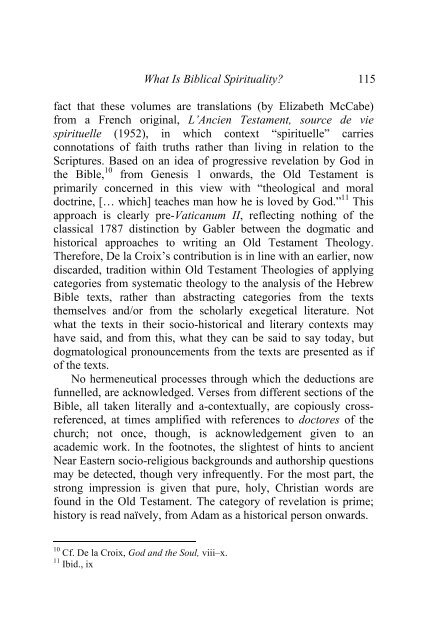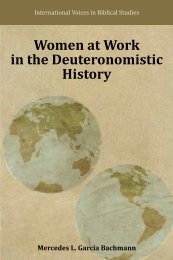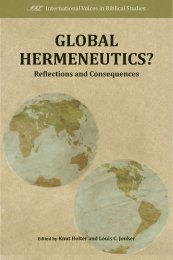The Old Testament and Christian Spirituality - International Voices in ...
The Old Testament and Christian Spirituality - International Voices in ...
The Old Testament and Christian Spirituality - International Voices in ...
Create successful ePaper yourself
Turn your PDF publications into a flip-book with our unique Google optimized e-Paper software.
What Is Biblical <strong>Spirituality</strong>? 115<br />
fact that these volumes are translations (by Elizabeth McCabe)<br />
from a French orig<strong>in</strong>al, L’Ancien <strong>Testament</strong>, source de vie<br />
spirituelle (1952), <strong>in</strong> which context “spirituelle” carries<br />
connotations of faith truths rather than liv<strong>in</strong>g <strong>in</strong> relation to the<br />
Scriptures. Based on an idea of progressive revelation by God <strong>in</strong><br />
the Bible, 10 from Genesis 1 onwards, the <strong>Old</strong> <strong>Testament</strong> is<br />
primarily concerned <strong>in</strong> this view with “theological <strong>and</strong> moral<br />
doctr<strong>in</strong>e, [… which] teaches man how he is loved by God.” 11 This<br />
approach is clearly pre-Vaticanum II, reflect<strong>in</strong>g noth<strong>in</strong>g of the<br />
classical 1787 dist<strong>in</strong>ction by Gabler between the dogmatic <strong>and</strong><br />
historical approaches to writ<strong>in</strong>g an <strong>Old</strong> <strong>Testament</strong> <strong>The</strong>ology.<br />
<strong>The</strong>refore, De la Croix’s contribution is <strong>in</strong> l<strong>in</strong>e with an earlier, now<br />
discarded, tradition with<strong>in</strong> <strong>Old</strong> <strong>Testament</strong> <strong>The</strong>ologies of apply<strong>in</strong>g<br />
categories from systematic theology to the analysis of the Hebrew<br />
Bible texts, rather than abstract<strong>in</strong>g categories from the texts<br />
themselves <strong>and</strong>/or from the scholarly exegetical literature. Not<br />
what the texts <strong>in</strong> their socio-historical <strong>and</strong> literary contexts may<br />
have said, <strong>and</strong> from this, what they can be said to say today, but<br />
dogmatological pronouncements from the texts are presented as if<br />
of the texts.<br />
No hermeneutical processes through which the deductions are<br />
funnelled, are acknowledged. Verses from different sections of the<br />
Bible, all taken literally <strong>and</strong> a-contextually, are copiously crossreferenced,<br />
at times amplified with references to doctores of the<br />
church; not once, though, is acknowledgement given to an<br />
academic work. In the footnotes, the slightest of h<strong>in</strong>ts to ancient<br />
Near Eastern socio-religious backgrounds <strong>and</strong> authorship questions<br />
may be detected, though very <strong>in</strong>frequently. For the most part, the<br />
strong impression is given that pure, holy, <strong>Christian</strong> words are<br />
found <strong>in</strong> the <strong>Old</strong> <strong>Testament</strong>. <strong>The</strong> category of revelation is prime;<br />
history is read naïvely, from Adam as a historical person onwards.<br />
10 Cf. De la Croix, God <strong>and</strong> the Soul, viii–x.<br />
11 Ibid., ix




